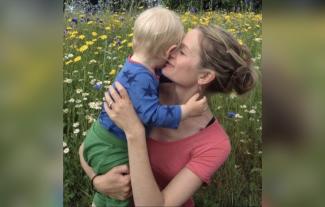A gift to be found: my son's stammer

Speech & language therapist Katherine Brown describes the feelings she experienced when her son started stammering, but tells us how she believes it has enriched both their lives.
There is a woodland path to the park, surrounded by tall oaks and beech trees. The sun shines through the leaves as my two-year-old and I walk, picking up treasures; there are feathers and sticks galore. Our conversation is about all that is around us, I comment on a find of his and he pulls on my hand. There is a light in his eyes. I pause, keen to hear his thoughts. I wait. I kneel to his level. Wait. Something feels different. Where his chatter should be there is emptiness, he seems to be stuck somehow, frozen.
I gently put my hands on his shoulders, look him in the eye, try to break the spell. After what feels like an eternity, something gives and his little toddler expressions come; frustration, confusion, fear. But still no words. Then his little body visibly deflates, he has given up. The intensity of his effort to speak, his despair and his lost battle, feel devastating. I ask him if it is difficult to talk sometimes, he nods. And then the tears come. From us both.
The intensity of his effort to speak, his despair and his lost battle, feel devastating.
When my son first started stammering, I put it down to developmental dysfluency. I knew that learning to speak was not always a straight road, and friends told me their children had gone through similar stages — repeating sounds, getting stuck on words — and that it was just part of language learning. But there was a part of me that was conflicted. As a mother, I understood that it could be 'just another phase', but as a speech & language therapist I could not shake the feeling that there was something more going on than just working out the right sounds. I allowed myself to wait and see for a while, but when he started to experience blocks in his speech, I knew that my boy had a stammer.
It had been a busy time for us, and so I worked hard to limit any kind of anxiety that my son could be experiencing. He was only two, so I was able to control his environment to a large extent. I let him have his dummy and we watched cartoons. Such was the emotional, all-consuming grip of the stammer, that these changes were entirely reactive and based on mother's intuition, rather than expertise from my professional training.
It has given me an extra perspective on parenting that I could not have otherwise had.
Time went on and my son grew. His stammer evolved with him and he became often fluent with fewer hesitations. He went to school, made friends and found interests. And now, ten years on, he is confident, loves sport, sings and plays instruments, and occasionally uses his own personally developed techniques to reset his speech, if he feels he needs to.
That desperate, early phase has gone, but I will never forget it. And it has left its mark on us all — a slightly careful, non-presumptuous, appreciative mark. I genuinely believe stammering has contributed to my son's social and emotional intelligence, and as a mother, it has given me an extra perspective on parenting that I could not have otherwise had. Professionally, I feel that I have a special, first-hand insight into stammering and its effects, and you can't learn that from a lecture. Maybe the stammer's mark is a gift, one that is helping us all to live with empathy, kindness and consideration, and to become the very best version of ourselves.
Has your child started stammering? If you're worried, call our free helpline on 0808 802 0002 or start a webchat. Read our information on how to support your child and to see what the options are.
Read more articles from parents.
Would you like to share your experiences? See Submit Something For The Site or email editor@stamma.org for details.


































